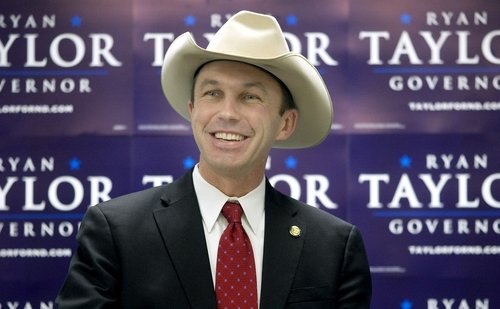Democrats Seem To Think Ryan Taylor Is Their Only Shot At Statewide Victory

At this stage in the election cycle there is a lot of punditry going on about which candidates will win and which will go down. There’s also public polling which may or may not be accurate, and which may or may not be conducted by people with an agenda.
But there’s a cliche about actions speaking louder than words that can be a useful in handicapping some of these races. Campaigns and political parties are always bullish about the chances of their candidate, but their actions can tell a different story.
And one action we can measure, because they’re required to disclose it, is how the political money is being distributed.
For instance, in the U.S. House race, Democrats have been trying to create a sense that George Sinner is in a horserace with incumbent Republican Kevin Cramer. Belying those claims is the fact that there is no evidence that Sinner is receiving an influx of political money – both in terms of donations to his campaign and spending by independent liberal groups – to help him beat Cramer. That’s a stark contrast from 2012 when Democrats insisted Heidi Heitkamp could beat Rick Berg for the Senate, and put their money where their mouths were by pouring funds into the race.
We can take a similar look at the statewide races in North Dakota. Every statewide office has a Republican incumbent and a Democrat challenger. So which of those challengers do Democrats think can win? Which of the incumbents to Republicans feel are in jeopardy?
State law requires that 39 days before election day that campaign committees report within 48 hours any contributions over $500. In this election cycle, that means campaigns had to start reporting those contributions on September 25th. This chart shows what each candidate has received in contributions over $500 since September 25th through this morning.
As you can see, the only race that has seen a significant amount of last-minute contributions is the Agriculture Commission race between Doug Goehring and Ryan Taylor. And Taylor has the benefit of that.
This would seem to tell us that the Democrats see the only really competitive race on the statewide ticket is Taylor’s. Which is surprising. I would have expected to see some activity in the Tax Commissioner race. Republican incumbent Ryan Rauschenberger missed about a month of campaign time while seeking treatment for alcohol addiction. You’d have thought Democrats would have poured money into that race to prop up their candidate, Jason Astrup, and take advantage but they haven’t.
Which doesn’t speak t a lot of faith in Astrup.
As for the Ag Commission race, it is worth nothing that Goehring has the lead in fundraising (though remember we’re now only seeing contributions over $500). Adding his reported 48-hour contributions to his pre-general fundraising total, he’s raised $311,553 to Taylor’s $278,093.41.
But that’s not a decisive advantage, and Democrats seem to feel that they can put Taylor over the top.
The polling seems to indicate otherwise. A recent UND/Forum Communications poll showed Goehring with an 18 point lead over Taylor, and while I think that’s probably given the Republican too much of an advantage, I can say that preliminaries of polling I’ve commissioned from DFM Research look pretty good for Goehring as well (we’ll be releasing the results of that polling next week).
Taylor has a lot to overcome to win, and so far he can’t seem to put himself on the right message.





